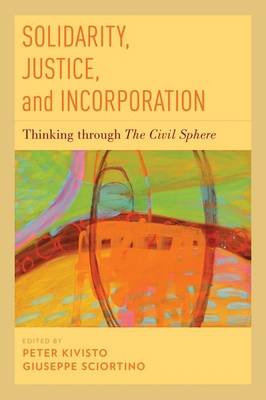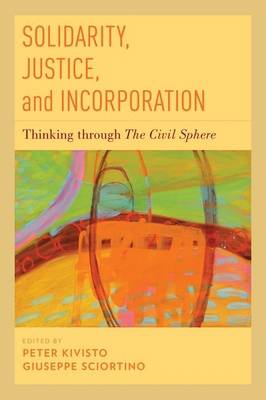
- Afhalen na 1 uur in een winkel met voorraad
- Gratis thuislevering in België vanaf € 30
- Ruim aanbod met 7 miljoen producten
- Afhalen na 1 uur in een winkel met voorraad
- Gratis thuislevering in België vanaf € 30
- Ruim aanbod met 7 miljoen producten
Zoeken
Solidarity, Justice, and Incorporation
Thinking Through the Civil Sphere
Peter Kivisto
Hardcover | Engels
€ 209,45
+ 418 punten
Omschrijving
Although many contemporary scholars have deepened our understanding of civil society through critiquing the limits of civil society discourse or seeking to offer empirical analyses of existing civil societies, none have attempted anything as bold or original as Jeffrey C. Alexander's 2006 book, The Civil Sphere. While consciously building on a three-centuries-long tradition of thought on the subject, Alexander has broken new ground by articulating a detailed theoretical framework that differs from the two major perspectives which have heretofore shaped civil society discourse. In so doing, he has sought to construct a model of what he calls the civil sphere, which he treats in Durkheimian fashion as a new social fact. In Solidarity, Justice, and Incorporation: Thinking through The Civil Sphere, six internationally recognized scholars comment on Alexander's civil sphere thesis. Robert Bellah, Bryan S. Turner, and Axel Honneth consider the work as a whole, while Mario Diani, Chad Alan Goldberg, and Farhad Khosrokhavar offer analyses of specific aspects of the civil sphere. In their substantive introduction, Peter Kivisto and Giuseppe Sciortino locate the civil sphere thesis in terms of Alexander's larger theoretical arc as it has shifted from neo-functionalism to cultural sociology. Alexander's concluding essay responds to their analyses by clarifying and elaborating on issues in the text while simultaneously addressing recurring misunderstandings of the thesis. Comprehensive and insightful, Solidarity, Justice, and Incorporation is an essential companion to The Civil Sphere. This compelling volume is a valuable resource for students and scholars of sociology, political science, and social philosophy.
Specificaties
Betrokkenen
- Auteur(s):
- Uitgeverij:
Inhoud
- Aantal bladzijden:
- 216
- Taal:
- Engels
Eigenschappen
- Productcode (EAN):
- 9780199811908
- Verschijningsdatum:
- 30/04/2015
- Uitvoering:
- Hardcover
- Formaat:
- Genaaid
- Afmetingen:
- 157 mm x 236 mm
- Gewicht:
- 417 g

Alleen bij Standaard Boekhandel
+ 418 punten op je klantenkaart van Standaard Boekhandel
Beoordelingen
We publiceren alleen reviews die voldoen aan de voorwaarden voor reviews. Bekijk onze voorwaarden voor reviews.











